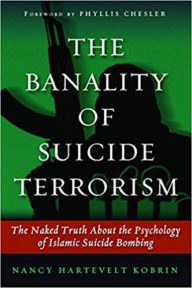
A Quick Deep Dive into Why Some Populations Are Not Observing Social Distancing:
“Internalizing” the Danger of the Coronavirus in Emotionally Religious Populations and Others and What Must Be Done
By Nancy Hartevelt Kobrin, Ph.D. March 22, 2020
I recently received a WhatsApp (March 21, 2020) to the CounterTerrorism experts here at the Islamic Theology of Counter Terrorism sent by its founder Noor Dahri. He wrote something profound concerning the outbreak of the coronavirus linked to a West Midlands church, (https://www.dailymail.co.uk/news/article-8137445/Coronavirus-outbreak-killed-28-West-Midlands-linked-church.html):
“This is what I am worrying about to shut the mosques completely but still some Mosques are open. These emotionally religious people [my emphasis] will be the cause of heavy deaths by the lack of their understanding about the disease of Coronavirus.” He hit the nail on the head and is absolutely right. Yet a quick but deep dive into the psychological problem is warranted. It is linked to early childhood development, a terrain that remains most scary to many experts. I will clarify the situation here in Israel, particularly Tel Aviv, but what I describe can be found across the globe and will be repeatedly encountered with tragic consequences in third world countries often where shame-honor cultures are found. This is the main psychological stumbling block in getting people to assume responsibility for their behavior in order to “flatten the curve.”
Here in Israel we have been having trouble securing the safety of the general population because there remain sectors who have not yet internalized the message of the severity of the Coronavirus. Simply put, internalize means that one takes in an idea and integrates it into one’s behavior. With coronavirus looming in our lives, a virus which we cannot see, it is all too easy to dismiss its gravity and potential to kill. In Israel there have been several sectors of the general population that have had trouble understanding and enacting the rules of social distancing such as massive gatherings for prayer, to going to the beach or the parks. There are basically three sectors which have been reluctant to internalize the restrictions set forth by the government and they all share one thing in common – denial which leads to lack of assuming responsibility for their behavior. They are terrified and they don’t even know it.
But how do we understand such flagrant violation of rules set forth for their own good?
A quick deep dive into the nature of the psychological defense of denial and these three populations should be helpful for law enforcement, the military and the general public to more effectively deal with these “people”. Notice that I do not use the word ‘individual.” The three sectors can be described as: the Haredim (the Ultra-Orthodox Jews) (https://www.jta.org/2020/03/18/israel/were-not-scared-some-haredi-orthodox-jews-in-israel-are-ignoring-coronavirus-social-distancing-rules and https://www.timesofisrael.com/as-virus-hits-tight-knit-haredi-communities-rabbis-among-first-to-fall-ill/; https://www.timesofisrael.com/liveblog-march-22-2020/#liveblog-entry-2265564), some enclaves within the Arab sector (https://hamodia.com/2020/03/19/netanyahu-pleads-arabs-observe-coronavirus-rules/) and the allegedly “modern” people who were out gallivanting around – going to the beach, the park etc. in Tel Aviv flouting the directives. All three share a similar psychological problem – they have not “grown up” in the modern western sense of the term, but after all we are here in the touchy-feely Middle East, (https://www.haaretz.com/israel-news/.premium-coronavirus-crisis-in-touchy-feely-israel-social-distancing-creates-big-challenge-1.8679776. All three missed an important developmental step — individuation and separation in early childhood. They may look like adults, but the “child” trapped within causes them to be so utterly narcissistic to the point of putting others at risk of dying. This is serious business. The State is tasked with protecting its citizens, but some of its citizens remain infantile. Why is that?
The Haredim and the Arab sectors are essentially shame-honor groups. Anthropologists call them “collectivist” groups; I prefer the term “group- self”. This means that for them the group-self is more important than the “person”. Notice again, that I do not use the word “individual” precisely because they are not developmentally individuated from their mothers and the maternal bond. The maternal terrain makes patriarchal societies or shame-honor groups excruciatingly painful to acknowledge, that is the central problem of dependency upon ironically a devalued female turned mother. Indeed, these groups create the “heroic” mother — be her “emush” in Hebrew slang the highly venerated “mommy”, or “ummi” in Arabic. Just think of all the songs that sing the praises of the mother, but in reality mistreat really the female. Of course, there are cultural differences between the Haredim and the Arab population, but both use the tool of shaming through gossip and scapegoating in order to maintain control and manipulate its group members. In the Talmud Tractate Baba Metzia it is written that “to shame a person in public, it is as if to spill blood.” In Arab culture there is the serious problem of gun violence and honor killing where “one must willfully spill blood in order to cleanse honor.” Shaming creates a herd mentality and protects the group-self from the outside world. Noor Dahri is correct in characterizing these groups as emotionally religious. Such volatile emotions were born and arise out of the early maternal bonding experience. Such groups struggle to fit into a modern nation-state, especially when such a state has been infiltrated by a deadly virus. These kinds of groups must realize and acknowledge this psychological shortcoming. The devil is in the details, so I refer the reader to my essay “The Violent Brutality of Growing Up in a Shame Honor Culture,” www.mentalitiesjournal.org). ’
But what about the secular population gallivanting around as if they are on holiday? Do they share something in common with the emotionally religious? For example WHO has noted that the millennials are not taking the problem seriously, cf. https://time.com/5807073/millennials-coronavirus-who/. These kids are in denial too. While it goes without saying that youth comes with a false sense of invincibility and lack of awareness that one lives within a hair breath of death daily, their grandiosity and omnipotence harken back to the same developmental problem. Their lack of critical thinking is poorly manifested by them selfishly put others at risk. Yet yesterday, along with the millennials, there was a broad age span including seniors strolling or jogging along Tel Aviv’s boardwalk and in the HaYarkon Park. They too share the same developmental problem.
What must be done? Assuredly, we do not want to waste the precious and limited state resources and its overtaxed law enforcement and military to say nothing of the stress on the medical system at such an acute time. This quick deep dive suggests that to name the psychological problem is indeed the first step in dealing with it. Honesty is the best policy even if it is painful. The coronavirus offers us a unique window of opportunity. For to recognize the nature of the psychological problem as a developmental delay in growth, be they members of a shame-honor group such as the Haredim, or the highly traditional Arab population, or those “seculars” galavanting about on the Tel Aviv boardwalk, the seriousness of the coronavirus offers us the possibility to set things right. People who don’t separate can’t grow up. They struggle to assume responsibility. It is not for naught that this is described as infantile behavior, but it is never too late to grow up. Doing so might just save their lives and others.
- The Violent Brutality of Growing Up in A Shame Honor Culture by Nancy Hartevelt Kobrin, Ph.D. - 05/17/2020
- The Coronavirus and Haredi Children – An Educable Moment? Dr. Nancy Hartevelt Kobrin - 04/13/2020
- A Quick Deep Dive into Why Some Populations Are Not Observing Social Distancing: “Internalizing” the Danger of the Coronavirus in Emotionally Religious Populations and Others and What Must Be Done - 03/27/2020







